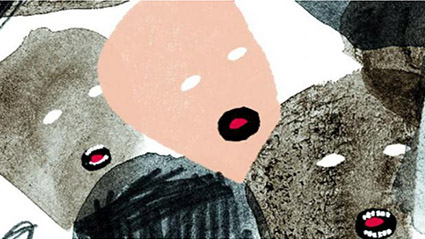Schizophrenia : early diagnosis is essential

Illustration: Keith Negley
A disease that occurs in young adults, schizophrenia still suffers today from a negative image. However, current care offers many patients real hope of integration.
A person hears an inner voice, he(she) thinks he's being threatened by people. Undoubtedly, these auditory hallucinations and delusions of persecution make him lose his bearings in reality and cause mental imbroglio. Is it enough to diagnose schizophrenia? "These symptoms are the most visible, but most often the person also presents other symptoms: apathy, difficulties to remain attentive and memorize, isolation, disorganization of thinking. In short, a fundamental change in his experiences and behaviour," says Professor
Stefan Kaiser, head doctor of the
adult psychiatry department at the HUG. "This mental illness causes intense anxiety and suffering that makes it difficult to live a professional and social life," adds Louise Dunnigan Rast, a nurse in the day program at the Centre ambulatoire de psychiatrie et de psychothérapie intégrés (
CAPPI) Eaux-Vives.
An insidious start
Schizophrenia usually occurs between the age of 18 and 25 and affects about 1% of the population. Its origin is unknown, but heredity (more than 100 genes involved) and environmental factors play a role. It can start insidiously : the subject gradually becomes introverted and increasingly isolated. "Change can go unnoticed for months or even years, until delusions or other manifestations are noticed by relatives. In other cases, the mental illness breaks out suddenly, under stress conditions," says the psychiatrist.
"Families notice the changes, but are distressed and often afraid to consult," adds Louise Dunnigan Rast. Still, early diagnosis is essential: the earlier a person is treated, the better their prognosis.
Patient at the center of the caring project
Schizophrenia is treated with a holistic approach. Treatments combine medication - very effective for hallucinations and delusions - with psychotherapeutic work and the rebuilding of a social network. "It is important to put the patient at the centre of the caring project," insists Professor Kaiser. "A psychotic episode is like a shipwreck: the person no longer knows where he is or where he wants to go. Our work consists, first of all, in getting him to accept the illness, then in recognizing the warning signs so that he can rebuild a positive identity. We help him to reinflate the lifejacket and adjust the sails to cope with any new storm. The family environment is a partner in supporting this recovery process," says the nurse.
And the results are there: patients with schizophrenia now have a good chance of recovery. One third have a family life, professional life, often with continuous treatment. Others have difficulties and need support, for example working in a sheltered workshop. Finally, some of them need the help of their families in their daily lives or live in a home center.
David, A long JOUrney
"At 20 years old, I was talking on the phone with God. These mystical ideas were mixed with suicidal thoughts," recalls David*. At the time, he was suffering from an inability to recognize his illness (called anosognosia). He declined over time, seeing his mental capacities reduced to nothing. "I was unable to have any dialogue with those around me and I even became aggressive because of the delirium of persecution," he says. Yet he is getting out of it. "The revelation came when I was called in by force. Suddenly I realized that everything was better if I took my medication. Then, trusting the caregivers set me in a positive dynamic. With the psychotherapy, I got to know myself, to put words to my emotions, to objectify my fears and anxieties. "A long journey of about ten years that lead him to recovery. "Even if the disease has been very disabling, you are not disabled for life: I have gotten my family back, my old friends and a job. I have a normal life because I have accepted my schizophrenia. I take my medication, have regular medical-nursing follow-up and strategies to manage my stress," concludes the 40-year-old, now an entrepreneur.
*Name has been changed
Author : Giuseppe Costa, HUG-Pulsations (FR) >
Translation : Tania Secalin with the help of DeepL
14 Jan 2018
NEWS

